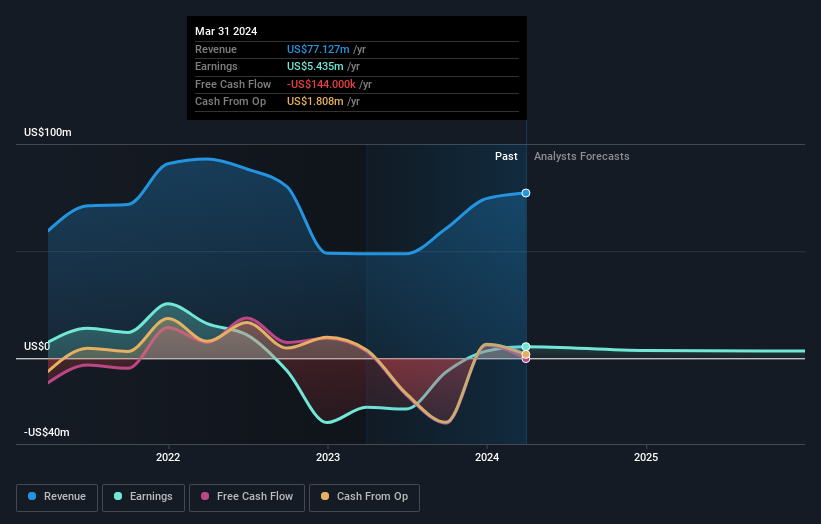Owning 39% shares,institutional owners seem interested in Ponce Financial Group, Inc. (NASDAQ:PDLB),
Key Insights
Institutions' substantial holdings in Ponce Financial Group implies that they have significant influence over the company's share price
51% of the business is held by the top 10 shareholders
Ownership research, combined with past performance data can help provide a good understanding of opportunities in a stock
If you want to know who really controls Ponce Financial Group, Inc. (NASDAQ:PDLB), then you'll have to look at the makeup of its share registry. With 39% stake, institutions possess the maximum shares in the company. Put another way, the group faces the maximum upside potential (or downside risk).
Since institutional have access to huge amounts of capital, their market moves tend to receive a lot of scrutiny by retail or individual investors. Therefore, a good portion of institutional money invested in the company is usually a huge vote of confidence on its future.
Let's take a closer look to see what the different types of shareholders can tell us about Ponce Financial Group.
Check out our latest analysis for Ponce Financial Group
What Does The Institutional Ownership Tell Us About Ponce Financial Group?
Many institutions measure their performance against an index that approximates the local market. So they usually pay more attention to companies that are included in major indices.
We can see that Ponce Financial Group does have institutional investors; and they hold a good portion of the company's stock. This can indicate that the company has a certain degree of credibility in the investment community. However, it is best to be wary of relying on the supposed validation that comes with institutional investors. They too, get it wrong sometimes. If multiple institutions change their view on a stock at the same time, you could see the share price drop fast. It's therefore worth looking at Ponce Financial Group's earnings history below. Of course, the future is what really matters.
Our data indicates that hedge funds own 9.7% of Ponce Financial Group. That's interesting, because hedge funds can be quite active and activist. Many look for medium term catalysts that will drive the share price higher. Our data shows that T. Rowe Price Group, Inc. is the largest shareholder with 11% of shares outstanding. For context, the second largest shareholder holds about 9.7% of the shares outstanding, followed by an ownership of 8.9% by the third-largest shareholder. Additionally, the company's CEO Carlos Naudon directly holds 1.6% of the total shares outstanding.
We also observed that the top 10 shareholders account for more than half of the share register, with a few smaller shareholders to balance the interests of the larger ones to a certain extent.
While it makes sense to study institutional ownership data for a company, it also makes sense to study analyst sentiments to know which way the wind is blowing. While there is some analyst coverage, the company is probably not widely covered. So it could gain more attention, down the track.
Insider Ownership Of Ponce Financial Group
While the precise definition of an insider can be subjective, almost everyone considers board members to be insiders. The company management answer to the board and the latter should represent the interests of shareholders. Notably, sometimes top-level managers are on the board themselves.
I generally consider insider ownership to be a good thing. However, on some occasions it makes it more difficult for other shareholders to hold the board accountable for decisions.
Shareholders would probably be interested to learn that insiders own shares in Ponce Financial Group, Inc.. As individuals, the insiders collectively own US$12m worth of the US$198m company. This shows at least some alignment, but we usually like to see larger insider holdings. You can click here to see if those insiders have been buying or selling.
General Public Ownership
The general public, who are usually individual investors, hold a 36% stake in Ponce Financial Group. While this size of ownership may not be enough to sway a policy decision in their favour, they can still make a collective impact on company policies.
Next Steps:
While it is well worth considering the different groups that own a company, there are other factors that are even more important. To that end, you should learn about the 2 warning signs we've spotted with Ponce Financial Group (including 1 which shouldn't be ignored) .
If you would prefer discover what analysts are predicting in terms of future growth, do not miss this free report on analyst forecasts.
NB: Figures in this article are calculated using data from the last twelve months, which refer to the 12-month period ending on the last date of the month the financial statement is dated. This may not be consistent with full year annual report figures.
Have feedback on this article? Concerned about the content? Get in touch with us directly. Alternatively, email editorial-team (at) simplywallst.com.
This article by Simply Wall St is general in nature. We provide commentary based on historical data and analyst forecasts only using an unbiased methodology and our articles are not intended to be financial advice. It does not constitute a recommendation to buy or sell any stock, and does not take account of your objectives, or your financial situation. We aim to bring you long-term focused analysis driven by fundamental data. Note that our analysis may not factor in the latest price-sensitive company announcements or qualitative material. Simply Wall St has no position in any stocks mentioned.
Have feedback on this article? Concerned about the content? Get in touch with us directly. Alternatively, email editorial-team@simplywallst.com

 Yahoo Finance
Yahoo Finance 

